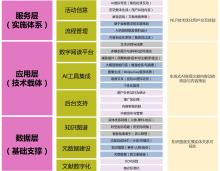| 1 |
陈立. 历史文献的阅读推广与可持续发展[J]. 国家图书馆学刊, 2015, 24(1): 46-51.
|
|
CHEN L. On reading promotion and sustainable development of historical documents[J]. Journal of the national library of China, 2015, 24(1): 46-51.
|
| 2 |
傅宝珍. 知识服务背景下古籍VR阅读推广研究[J]. 图书馆工作与研究, 2022(1): 108-115.
|
|
FU B Z. Reseach on VR reading promotion of ancient books under the background of knowledge service[J]. Library work and study, 2022(1): 108-115.
|
| 3 |
杨俊, 谭丰隆, 陈婧. 从ChatGPT到“LibGPT”: 生成式人工智能驱动的新一代图书馆[J]. 图书情报工作, 2024, 68(9): 3-12.
|
|
YANG J, TAN F L, CHEN J. From chat GPT to "lib GPT": Generative artificial intelligence-driven new generation libraries[J]. Library and information service, 2024, 68(9): 3-12.
|
| 4 |
赵瑞雪,黄永文,马玮璐,等.ChatGPT对图书馆智能知识服务的启示与思考[J].农业图书情报学报,2023,35(1):29-38.
|
|
ZHAO R X, HUANG Y W, MA W L, et al. Insights and reflections of the impact of ChatGPT on intelligent knowledge services in libraries[J]. Journal of library and information science in agriculture, 2023, 35(1): 29-38.
|
| 5 |
安子栋, 敬卿, 郝志超, 等. 基于生成式AI技术的图书馆文献资源管理创新策略[J]. 图书馆工作与研究, 2023(S1): 9-16.
|
|
AN Z D, JING Q, HAO Z C, et al. Innovative strategies of library literature resources management based on generative AI technology[J]. Library work and study, 2023(S1): 9-16.
|
| 6 |
黄爱平. 历史文献学学科基础理论与教材编写的思考[J]. 文献, 2013(1): 3-10.
|
|
HUANG A P. Reflections on the basic theory of historical philology and the compilation of teaching materials[J]. The documentation, 2013(1): 3-10.
|
| 7 |
茆意宏. 数字阅读推广的概念、机制与模式[J]. 图书情报知识, 2020, 37(2): 51-59.
|
|
MAO Y H. Conception, mechanism and pattern of digital reading promotion[J]. Documentation, information & knowledge, 2020, 37(2): 51-59.
|
| 8 |
周笑盈. 虚拟现实技术在古籍智慧化阅读推广中的应用与实践[J]. 农业图书情报学报, 2022, 34(8): 79-91.
|
|
ZHOU X Y. Application and practice of virtual reality technology in the intelligent reading promotion of ancient books[J]. Journal of library and information science in agriculture, 2022, 34(8): 79-91.
|
| 9 |
Library Harvard. At Harvard Library, building a tool that understands[EB/OL]. [2025-03-16].
|
| 10 |
ASSAEL Y, SOMMERSCHIELD T, SHILLINGFORD B, et al. Restoring and attributing ancient texts using deep neural networks[J]. Nature, 2022, 603(7900): 280-283.
|
| 11 |
NOCKELS J, GOODING P, AMES S, et al. Understanding the application of handwritten text recognition technology in heritage contexts: A systematic review of Transkribus in published research[J]. Archival science, 2022, 22(3): 367-392.
|
| 12 |
International Federation of Library Associations and Institutions. Using innovative technologies to reimagine libraries and archives services in the National Library Board Singapore[EB/OL]. [2025-03-16].
|
| 13 |
北京大学数字人文研究中心. 吾与点古籍智能处理平台[EB/OL]. [2025-03-16].
|
| 14 |
北京文点益度科技有限公司. 吾与点智能数据平台-智能数据处理解决方案 | 吾与点智能数据平台[EB/OL]. [2025-03-16].
|
| 15 |
全国报刊索引平台[EB/OL]. [2025-03-16].
|
| 16 |
周笑盈. 国家图书馆“《永乐大典》VR全景文化典籍”实践探索: 虚拟现实赋能图书馆沉浸式阅读推广的创新路径[J]. 国家图书馆学刊, 2022, 31(6): 80-89.
|
|
ZHOU X Y. Practical exploration of "VR panoramic cultural classics of the Yongle canon" in the national library of China: Innovative path of immersive reading promotion enabled by virtual reality in libraries[J]. Journal of the national library of China, 2022, 31(6): 80-89.
|
| 17 |
吴若航, 茆意宏. 生成式人工智能变革图书馆阅读推广研究[J]. 图书与情报, 2023(6): 62-69.
|
|
WU R H, MAO Y H. Research on the transformation of library reading promotion from the perspective of generative artificial intelligence[J]. Library & information, 2023(6): 62-69.
|
| 18 |
李鹏, 宋西贵. AIGC技术赋能图书馆阅读推广工作的创新应用[J]. 农业图书情报学报, 2023, 35(12): 84-93.
|
|
LI P, SONG X G. AIGC technology enables innovative applications in library reading promotion[J]. Journal of library and information science in agriculture, 2023, 35(12): 84-93.
|
| 19 |
刘琼, 刘桂锋, 王鹏. AIGC赋能图书馆阅读推广智慧服务的框架和应用研究[J]. 图书馆学研究, 2024(2): 108-118, 107.
|
|
LIU Q, LIU G F, WANG P. Research on the intelligent service framework and application of reading promotion in AIGC empowered libraries[J]. Research on library science, 2024(2): 108-118, 107.
|
| 20 |
肖鹏, 邓默言, 苏洁, 朱海缘. 阅读推广标准化建设研究报告(2023年版)[J]. 农业图书情报学报, 2023, 35(10): 34-47.
|
|
XIAO P, DENG M Y, SU J, et al. Report on the standardization of reading promotion (2023 Edition)[J]. Journal of library and information science in agriculture, 2023, 35(10): 34-47.
|
| 21 |
皇甫娟. AI赋能的图书馆数字阅读推广场景化服务模式研究[J]. 图书馆界, 2022(5): 6-10.
|
|
HUANGFU J. Research on scenario service mode of library digital reading promotion enabled by AI[J]. Library world, 2022(5): 6-10.
|
| 22 |
刘琼, 周云峰, 苏文成, 等. AIGC环境下阅读推广规范化管理体系研究[J]. 农业图书情报学报, 2023, 35(10): 48-57.
|
|
LIU Q, ZHOU Y F, SU W C, et al. Standardized management system for reading promotion under AIGC technology environment[J]. Journal of library and information science in agriculture, 2023, 35(10): 48-57.
|
| 23 |
陈柳红. 人工智能阅读器对儿童阅读效果的实证研究: 以比巴为例[J]. 山东图书馆学刊, 2021(4): 68-71.
|
|
CHEN L H. An empirical study of artificial intelligence readers in children’s reading: Taking Biba as an example[J]. The library journal of Shandong, 2021(4): 68-71.
|
| 24 |
宫平. 人工智能在图书馆绘本阅读领域的应用模式探索[J]. 图书馆学研究, 2020(2): 88-92, 101.
|
|
GONG P. The application mode of artificial intelligence in the field of picture book reading in library[J]. Research on library science, 2020(2): 88-92, 101.
|
| 25 |
王军, 刘成林, 金连文, 等. 系列笔谈之四: 智能时代古籍OCR技术[J]. 数字人文, 2022(3): 95-125.
|
|
WANG J, LIU C L, JIN L W, et al. Series of essays IV: OCR technology of ancient book in the era of intelligence[J]. Digital humanities, 2022(3): 95-125.
|
| 26 |
XIE Z C, HUANG Y X, JIN L W, et al. Weakly supervised precise segmentation for historical document images[J]. Neurocomputing, 2019, 350: 271-281.
|
| 27 |
HU W Y, CAI X C, HOU J, et al. GTC: Guided training of CTC towards efficient and accurate scene text recognition[J]. Proceedings of the AAAI conference on artificial intelligence, 2020, 34(7): 11005-11012.
|






